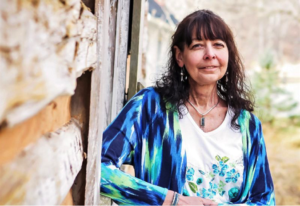 Karenne Wood of Kents Store, Va., an advocate for Virginia’s Indian tribes, died Sunday morning, July 21, 2019. She was 59.
Karenne Wood of Kents Store, Va., an advocate for Virginia’s Indian tribes, died Sunday morning, July 21, 2019. She was 59.
Wood joined the Virginia Humanities Board as a member in 2004 as its first Virginia Indian representative. She joined the staff in 2007. She was the director of Virginia Humanities’ Virginia Indian Programs
In 2009, Virginia Humanities received the Federation of State Humanities Programs’ highest honor—the Schwartz Prize—for her work, which included numerous statewide speaking engagements and a printed guide to the state-recognized tribes. She was also instrumental in updating Virginia’s Standards of Learning to frame a more enlightened understanding of indigenous peoples in the region’s past as well as an awareness that Virginia Indian cultures and communities are a vital part of the country’s present and future.
“The Monacan people will always be in her debt,” said Chief Kenneth Branham of the Monacan tribe. “She worked endlessly and tirelessly for the tribe. She wrote numerous grant applications that helped us with state recognition and federal recognition, and with upkeep of the tribal lands we own; I don’t know what we would have done without her. She helped not only the Monacan – she helped all Indians in the state and across the country.”
We were blessed to have Karenne as a part of our organization for more than a decade,” said Matthew Gibson, Virginia Humanities’ executive director. “I think one of the most enduring legacies of her work was her participation in the revision of Virginia’s Social Studies Standards of Learning to include Virginia Indians as current, living members of our state, not just people of the past. There’s this aphorism by Nelson Henderson that I think about in relation to Karenne’s work: ‘The true meaning of life is to plant trees under whose shade you do not expect to sit.’ I think what Karenne did with her work on Virginia’s SOLs was a wonderful embodiment of who she was as an individual: she put the hard work in knowing that even if she never saw the impact or got credit for it, it would flourish for generations to come.
In the last few years her work went digital. She produced the Virginia Indian Archive and advised on several Virginia Indian entries in its Encyclopedia Virginia so that Virginians could have lasting educational resources to interpret Virginia Indian history and cultures in ways that are accurate, culturally sensitive, and broadly accessible.
She wrote two poetry collections, Markings on Earth (2001) and Weaving the Boundary (2016). Her work has been included in the native writing anthologies Sister Nations and The People Who Stayed as well as in former U.S. Poet Laureate Tracy K. Smith’s podcast, The Slowdown. In 2015, she was recognized as one of the notable “Virginia Women in History” as awarded by the Library of Virginia.
Much of her work has also been preserved in the Virginia Humanities’ Discovery Virginiaarchive. It’s an incomplete testament to a lifelong career dedicated to telling a more honest and inclusive history of Virginia’s native people.
In a 2014 interview, she referred to her work as “illuminating the experiences of … those whose ancestors first shaped the land we now call Virginia.”

